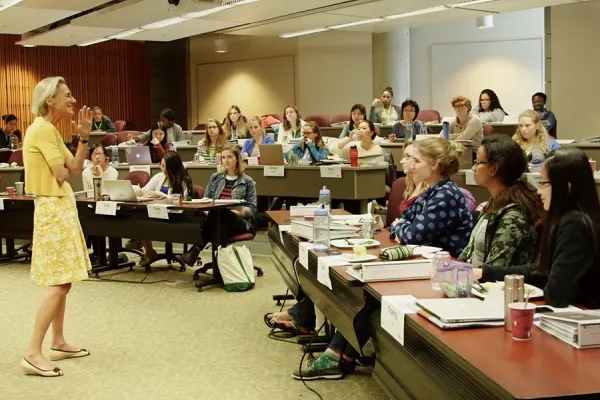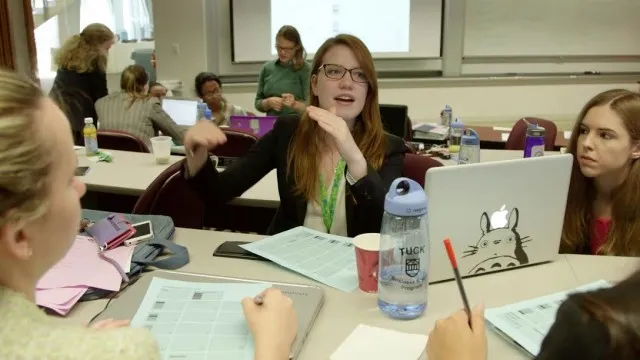Giving Students an Edge: Smith-Tuck Program Boosts Business Skills, Contacts
Campus Life

Published June 9, 2015
Smithie Sarah Mellies says a new business training program now underway on campus is helping her learn how to “ask better questions” about a career in business.
“I’m learning about spreadsheets, accounting and all the necessary basics,” said Mellies, an Ada Comstock Scholar and newly declared economics major. “This program is also opening my eyes to everything I need to know about managing organizations.”
Recent graduate Alexandra Williams ’15 said the program is helping her decide whether to pursue an M.B.A.
“I’ve always wanted to see what business was like, but I never really had exposure before,” said Williams. “This is helping me solidify what parts of business I like and am inspired by. It’s looking like I do want to do an M.B.A.”
The two students are among 38 college women—30 of them Smithies—who were selected for the inaugural Smith-Tuck Business Bridge Program that began May 25 on campus.
The intensive three-week program, a partnership between Smith and Dartmouth College’s Tuck School of Business, combines practical skills training and valuable networking opportunities for undergraduate women.
Classes being taught at Smith by faculty members from Tuck’s M.B.A. program include sessions on marketing, corporate finance and managerial leadership—among other topics.
Smith-Tuck students have also been able to take advantage of alumnae panels, mock interviews and networking sessions with women business leaders, as well as hands-on research projects about specific companies.

A class session during the Smith-Tuck Business Bridge Program which launched May 25 on campus.
Members of the campus community will have a chance to learn about those projects Friday, June 12, when students will present their findings to a panel of alumnae reviewers from 9 a.m. to noon in the Campus Center on the final day of the program.
Alumna Kathryn Burdett ’97, vice president and head of diversity and inclusion for Deutsche Bank Americas, said she was thrilled to be invited to review student work and provide Smith-Tuck participants with a perspective on her experience in corporate human resources.
“I’m looking forward to seeing first-hand the business acumen that Smithies and others will be able to demonstrate as a result of their participation in this program,” Burdett said.
By giving students the skills they need to compete, the Smith-Tuck program aims to boost the number of qualified women in business—an area where women remain underrepresented despite progress in recent decades.
In her keynote address to students in the program, Smith alumna Shelly Lazarus ’68 described what it was like to be “the only woman in the room” when she began her storied career in advertising.
“There would always be that moment when everyone would turn to me and say, ‘Well, Shelly, what do women think?’” she recalled.
Lazarus—who was one of only a handful of women to earn an M.B.A. from Columbia University in the 1970s, and who went on to become chair and CEO of Ogilvy & Mather—said there is a need for more training programs geared to women.
“We need more women leaders in business. I feel that profoundly,” Lazarus said.
She urged students to follow their passions and to seek opportunities to be themselves in the business world.
“I’ve been able to work with so many different companies in so many countries,” said Lazarus, who has been described as one of the world’s most powerful advertising executives. “I can tell you there is not a single model for how to lead and how to be a CEO. The people who are the most successful are the most authentic. Take who you are, and go with it!”
The Smith-Tuck schedule mixes such inspiration with skills training in what Stacie Hagenbaugh, director of the Lazarus Center for Career Development at Smith, described as “professional boot camp.”
“Just in the first week I have seen students’ confidence levels growing,” Hagenbaugh said. “They are learning concepts that are new and quite challenging and finding that they can be successful in the process.”
One morning last week, students in Robert Hansen’s class were grappling with a case study from the late 1970s involving a family-owned manufacturer of nuts and bolts in the Berkshires.
Hansen, senior associate dean and Norman W. Martin 1925 Professor of Business Administration at Tuck, led students through a careful analysis of the company’s profit and loss sheets. By closely examining those figures and using what they’d learned earlier about fixed and variable costs, students discovered that the owner’s decision to stop producing a particular product line was a mistake.
“Should they drop the 300 series? Put it in words why not,” Hansen encouraged the class.
“The 300 series is helping them to cover their total fixed costs,” one student replied.
“Yes” Hansen replied. “Getting rid of the series is a big mistake. Instead, what they should be doing is adding a product line.”
In addition to offering top-notch training, Smith-Tuck is timed so that students can still participate in summer internships after the program ends this week.
Ada Comstock Scholar Mellies—who hopes one day to start a sports apparel business—said a classmate gained a contact for an internship in one of the Smith-Tuck networking sessions.
When asked whether she would recommend the program to other students, Mellies didn’t hesitate.
“I would say, ‘Do it!’” she said. “Even for people who aren’t going into business or finance, this still gives them an edge, a skill set. It’s a huge advantage.”
Alumna Shelly Lazarus ’68, chair emerita of Ogilvy & Mather, speaks to students in the Smith-Tuck Business Bridge program on campus.